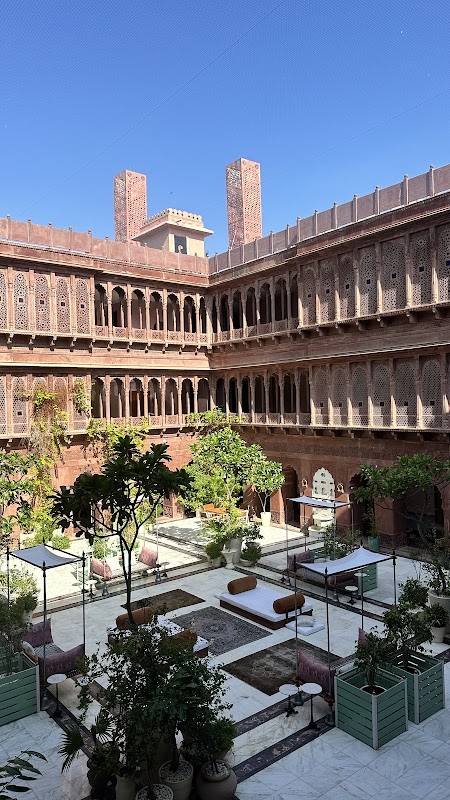
Desert Festival of Rajasthan: A Vivid Celebration in Bikaner
Experience the Desert Festival in Bikaner, Rajasthan—an annual celebration that showcases the vibrant culture of the Thar Desert with camel races, folk performances, and traditional sports. This lively event invites adventurers to witness Rajasthan’s heritage in an environment that tests both body and spirit.
Wear Sturdy Closed Footwear
The desert terrain is uneven and sandy, making closed shoes crucial for comfort and protection against hot sand and sharp grit.
Hydrate Constantly
Dry desert air causes quick dehydration—carry at least 2 liters of water and sip regularly to maintain energy levels during festival activities.
Go Early or Late in the Day
The strongest sun hits midday, so plan your outdoor exploration around early mornings or late afternoons when temperatures are manageable.
Protect Against Dust and Sun
Pack sunscreen, sunglasses, and a wide-brimmed hat to shield your skin and eyes from the harsh sun and shifting desert winds during events.
Desert Festival of Rajasthan: A Vivid Celebration in Bikaner
The Desert Festival of Rajasthan in Bikaner offers more than an event — it’s an immersive dive into the raw spirit of the Thar Desert that challenges and charms every visitor. Held annually in late January or early February, this festival transforms the gritty, sunbaked sands into a lively stage where tradition, courage, and the desert's fierce rhythms come alive.
Bikaner, a city forged from the relentless desert around it, hosts this vibrant festival with pride. You enter an arena where camels parade with elaborate adornments, dancers move with the pulse of centuries-old folk tunes, and storytellers engage audiences with tales that the desert wind carries.
The festival grounds spread across a flat desert expanse just outside Bikaner, with space enough for camel races, turban tying contests, and traditional wrestling bouts. Expect sandy, uneven terrain where your footing often meets loose, shifting dunes that dare you to steady yourself.
Each day breaks with pale dawn light that quickly sharpens into an intense sun, pressing heat despite the crisp winter air. Morning and late afternoon offer the best times for exploration, while midday calls for shelter and hydration. The desert breeze, sometimes gentle, sometimes biting, pulls the air forward like it’s pushing you to engage fully with this fiercely alive environment.
Practical tips tip the balance toward preparation: sturdy, closed footwear is essential to protect against hot sand and uneven surface; carrying at least two liters of water will help combat dehydration in the dry desert climate; and packing a wide-brimmed hat and sunscreen shields you from the relentless sun. Timing your visit for the festival allows a unique peek into Rajasthan’s culture beyond the typical sightseeing, but always prepare for dusty winds and limited shade.
What you’ll take away goes beyond memories of dazzling dances and camel rides. The Desert Festival paints a picture of resilience where human spirit meets the desert’s primal tone—a blend of tradition and challenge, a reminder that adventure doesn’t always take you up mountains; sometimes it’s about standing firmly where the earth is stubborn and alive.
This festival is more than entertainment; it’s an engagement with Rajasthan’s living heritage, one that demands respect and rewards those who step into its sun-drenched arena ready to listen, watch, and embrace the desert with clear eyes and open heart.
Nearby Trips
All Adventures
Boat Charters
Water Activities
Adventures near Bikaner, Rajasthan
Discover the unique and memorable adventures that make Bikaner, Rajasthan special.
Frequently Asked Questions
When exactly does the Desert Festival take place?
The festival is usually held over three days in late January or early February, coinciding with the cooler winter months for more comfortable desert weather.
Is the festival accessible for families and children?
Yes, the festival has attractions suitable for families, including camel rides and folk performances, but parents should be prepared for dusty conditions and ensure hydration.
What kind of traditional events should I expect?
Expect camel races, turban tying competitions, folk dance performances, traditional music, puppet shows, and wrestling matches, each reflecting Rajasthan’s rich desert culture.
Are there opportunities for seeing local wildlife during the festival?
While the festival grounds focus on cultural displays, keep an eye out for desert foxes and birds like the Indian courser in the outskirts of Bikaner’s desert.
Can I find accommodations nearby during the festival?
Bikaner city offers a range of hotels and guesthouses. Booking early is recommended as the festival attracts many tourists and accommodations fill quickly.
What environmental considerations should I keep in mind?
Respect the fragile desert ecosystem by disposing of waste properly, minimizing plastic use, and avoiding disturbing natural habitats, as the desert environment is easily impacted.
Recommended Gear
Closed Hiking Shoes or Sturdy Sandals
Protects feet from hot sand, rough patches, and provides stability during camel race viewing and wandering the festival grounds.
Wide-brimmed Hat
Essential shade against the harsh desert sun during daytime festival activities.
Water Bottle with Filtration (2L minimum)
Ensures you stay hydrated in the dry desert air where dehydration is quick and constant.
Lightweight Scarf or Bandana
Protects face from dust and sand when winds pick up, a common occurrence in the desert.
Local Insights
Hidden Gems
- "Gajner Wildlife Sanctuary – a short drive offering desert-adapted wildlife viewing."
- "Junagarh Fort – a massive desert fort providing architecture and history within Bikaner."
Wildlife
- "Indian Bustard"
- "Desert Fox"
- "Camera Bird"
History
"Bikaner's origins as a desert fortress city blend with the festival’s cultural roots, showcasing centuries-old Rajput and Rajasthani traditions still practiced across rural desert communities."
